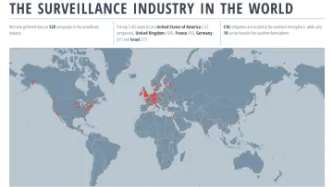Search
Content type: News & Analysis
Privacy International (PI) has today warned UK regulatory and law enforcement bodies about the potential deployment of an extensive and potentially nationwide police facial recognition surveillance system. We are urging them to investigate and take steps to ensure that no ‘backdoor’ for unlawful facial recognition surveillance will be developed under the umbrella of a crime reporting system.
According to pricing and data-sharing templates, UK surveillance company Facewatch is offering to…
Content type: Explainer
At first glance, infrared temperature checks would appear to provide much-needed reassurance for people concerned about their own health, as well as that of loved ones and colleagues, as the lockdown is lifted. More people are beginning to travel, and are re-entering offices, airports, and other contained public and private spaces. Thermal imaging cameras are presented as an effective way to detect if someone has one of the symptoms of the coronavirus - a temperature.
However, there is little…
Content type: Examples
Aided by its small size, Singapore's contact tracing efforts were a key element of controlling the virus's spread; detectives used CCTV footage to locate the contacts of more than 6,000 people. Singapore also contacts individuals required to self-isolate several times a day and requires them to send photographic proof of their location. Breaking quarantine attracts substantial penalties, including jail terms, and in one case stripped an offender of his residency rights. Singapore also quickly…
Content type: Examples
Russian authorities are using surveillance cameras, facial recognition systems, and geolocation to enforce a two-week quarantine regime affecting 2,500 people. Chinese citizens are banned from entering Russia; Russians and citizens of other countries who arrive from China are required to go through two weeks of quarantine. Police raid hotels to find Chinese citizens who arrived before border controls began, and bus drivers have been ordered to call their dispatchers if they see Chinese citizens…
Content type: Impact Case Study
What is the problem
For over two decades we have been documenting an alarming use and spread of surveillance. It is no longer just the wars on terror or drugs or migration that is driving this trend. The management of health crises and distribution of welfare regularly are among others being used to justify this turn to increasingly invasive forms of surveillance. From country to country we see the same ideas and the same profiteers expanding their reach.
When we first released our report on…
Content type: Explainer
What is the Global Surveillance Industry?
Today, a global industry consisting of hundreds of companies develops and sells surveillance technology to government agencies around the world. Together, these companies sell a wide range of systems used to identify, track, and monitor individuals and their communications for spying and policing purposes. The advanced powers available to the best equipped spy agencies in the world are being traded around the world. It is a…



